Chickenhawk is a political term used in the United States to describe a person who is a war hawk yet actively avoids or avoided military service when of age. In political usage, chickenhawk is a compound of chicken and hawk from war hawk. Generally, the implication is that chickenhawks lack bravery to participate in war themselves, preferring to ask others to support, fight, and die in an armed conflict.

Ronald Ellwin Evans Jr. was an American electrical engineer, aeronautical engineer, officer and aviator in the United States Navy, and NASA astronaut. As Command Module Pilot on Apollo 17 he was one of the 24 astronauts to fly to the Moon, and one of 12 people to fly to the Moon without landing.
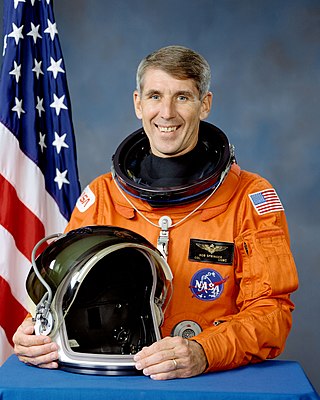
Robert Clyde Springer is a retired American astronaut and test pilot who flew as a mission specialist on two NASA Space Shuttle missions in 1989 and 1990. A decorated aviator in the United States Marine Corps, Springer also flew more than 500 combat sorties during the Vietnam War. He has logged over 237 hours in space and 4,500 hours flying time, including 3,500 hours in jet aircraft.

Marine Helicopter Squadron One (HMX-1) is a United States Marine Corps helicopter squadron responsible for the transportation of the president and vice president of the United States, heads of state, Department of Defense officials, and other VIPs as directed by the Marine Corps and White House Military Office. A Marine helicopter with the president aboard uses the call sign "Marine One". Previously, HMX-1 was also tasked with operational test and evaluation (OT&E). This task was reassigned to VMX-1 in Yuma, Arizona; since the contract award of the new presidential helicopter in 2014 to Sikorsky Aircraft, however, HMX-1 has assumed the temporary role of OT&E for this platform, because of its unique nature and mission. The VH-92A first flew in 2017 and became operational in 2024. Nicknamed "Nighthawks", HMX-1 is headquartered at Marine Corps Air Facility Quantico, Virginia, and maintains detachments at Joint Base Anacostia–Bolling in Washington, D.C., and Joint Base Andrews Naval Air Facility in Maryland.
David Samuel Anthony Lord, was a recipient of the Victoria Cross, the highest award for gallantry in the face of the enemy that can be awarded to British and Commonwealth forces. A transport pilot in the Royal Air Force, Lord received the award posthumously for his actions during the Battle of Arnhem while flying resupply missions in support of British paratroops.

Jesus nut is a slang term for the main rotor retaining nut or mast nut, which holds the main rotor to the mast of some helicopters. The related slang term Jesus pin refers to the lock pin used to secure the retaining nut. More generally, Jesus nut is used to refer to any component that is a single point of failure and whose breakdown would result in catastrophic consequences, the suggestion being that in such case the only thing left to do would be to pray to Jesus, or that the component's importance could be likened to the importance of Jesus to Christianity.
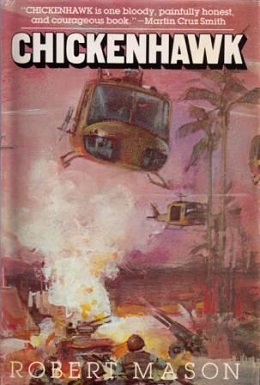
Chickenhawk is Robert Mason's narrative of his experiences as a "Huey" UH-1 Iroquois helicopter pilot during the Vietnam War. The book chronicles his enlistment, flight training, deployment to and experiences in Vietnam, and his experiences after returning from the war.
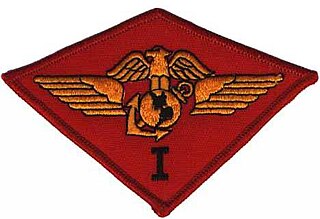
The 1st Marine Aircraft Wing is an aviation unit of the United States Marine Corps that serves as the Aviation Combat Element of the III Marine Expeditionary Force. The wing is headquartered at Camp Foster on the island of Okinawa, Japan. Activated in 1940, the wing has seen heavy combat operations during World War II, the Korean War, and the Vietnam War.

Weapon is a 1989 science fiction novel by Robert Mason. The book was Mason's first novel; he had previously written a memoir about his experiences in Vietnam titled Chickenhawk. The book is about an android, designed to kill, which experiences a crisis of conscience and runs away from its government masters to live in a Nicaraguan village.

Operation Wheeler/Wallowa was a U.S. offensive operation during the Vietnam War, launched on 11 September 1967 as two separate operations and concluding in November 1968. Initially named as Operation Wheeler and Wallowa, this was merged in November 1967 as Wheeler/Wallowa. The operation was at first conducted by the 101st Airborne Division and 1st Cavalry Division, but it was progressively taken over by 23rd Infantry (Americal) Division.

Patrick Henry Brady, is a retired United States Army major general. While serving as a helicopter pilot in the Vietnam War, he received the Medal of Honor, the nation's highest military decoration for valor.
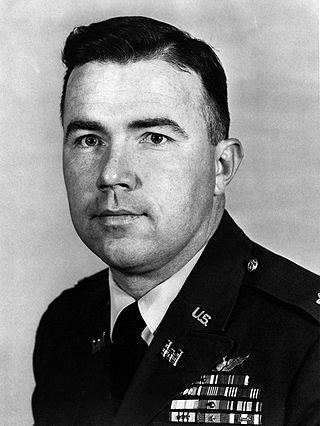
Bruce Perry Crandall is a retired United States Army officer who received the Medal of Honor for his actions as a pilot during the Battle of Ia Drang on November 14, 1965, in South Vietnam. During the battle, he flew 22 missions in a Bell Huey helicopter into enemy fire to evacuate more than 70 wounded and bring ammunition and supplies to United States forces. His actions in the battle of the Ia Drang valley were portrayed by actor Greg Kinnear in the Mel Gibson film, We Were Soldiers. By the end of the Vietnam War, he had flown more than 900 combat missions. He retired from the army as a lieutenant colonel and worked several jobs in different states before settling down with his wife in his home state of Washington. As of 2024, Crandall lives in Tempe, Arizona.

Ed W. "Too Tall" Freeman was a United States Army helicopter pilot who received the United States military's highest decoration, the Medal of Honor, for his actions in the Battle of Ia Drang during the Vietnam War. During the battle, he flew through machine gunfire 14 times, bringing supplies to a trapped American battalion and flying dozens of wounded soldiers to safety. Freeman was a wingman for Major Bruce Crandall who also received the Medal of Honor for the same missions.

Operation Pony Express was the covert transportation of, and the provision of aerial support for, indigenous soldiers and material operating across the Laotian and North Vietnamese borders during the Vietnam War. It was provided by Sikorsky CH-3C helicopters of the US 20th Helicopter Squadron, the only USAF combat helicopter squadron in Vietnam, which had been transferred there in 1965 and was known as the "Pony Express".

The Experimental Military Unit (EMU) was a joint Australian-American company-sized helicopter assault force which operated during the Vietnam War. The unit was created in 1967 following a request from the United States military for Australia to send more helicopter pilots to the conflict. As the only available personnel were from the Royal Australian Navy (RAN) Fleet Air Arm, the RAN Helicopter Flight Vietnam (RANHFV) was formed and integrated into the 135th Assault Helicopter Company of the United States Army. The EMU unit name was selected by the Americans as a backronym for the Australian bird, a choice which amused the Australians: despite being large, fast, and highly mobile, the emu cannot fly.

Operation Mikado was the code name of a military plan by the United Kingdom to use Special Air Service troops to attack the home base of Argentina's five Super Etendard strike fighters at Río Grande, Tierra del Fuego, during the 1982 Falklands War. Brigadier Peter de la Billière was in charge of planning the operation.
Larry Snook is a retired United States Army Colonel who served as Grimes County Judge from January 1, 1991, to December 31, 1994, and Grimes County Commissioner, Precinct 1 from January 1, 2000, to December 31, 2003.
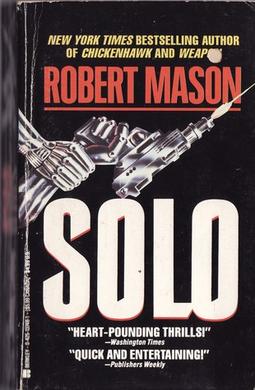
Solo is a 1993 science fiction novel by Robert Mason. The book was Mason's second novel; he had previously written Weapon and a memoir about his experiences in Vietnam titled Chickenhawk.

Camp Radcliff is a former United States Army base in the An Khê District in central Vietnam.

Alan "Ace" Cozzalio was an American army officer, primarily known for his distinguished service as a helicopter pilot in the Vietnam War. Initially nominated for the Medal of Honor, he instead received the Distinguished Service Cross as well as every lesser commendation of valor. He remained in the army, rising to the rank of Lieutenant colonel before being medically retired due to heart problems. He died six years later at the age of 46 after an unsuccessful heart transplant operation.

















